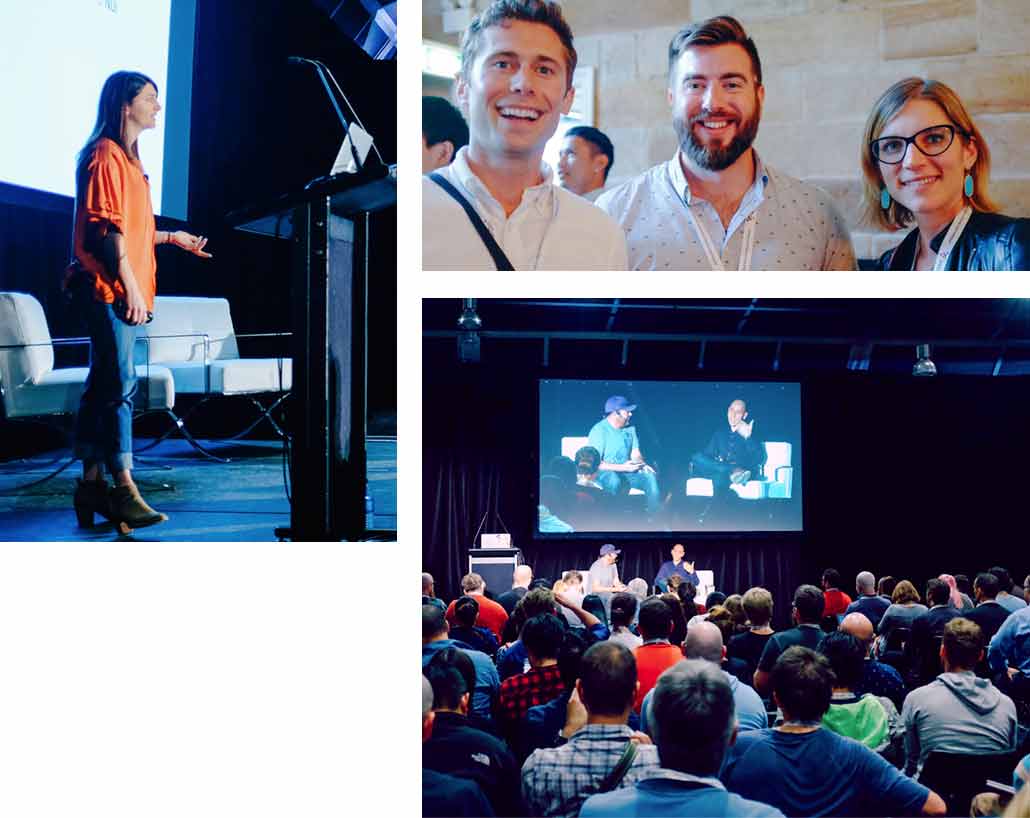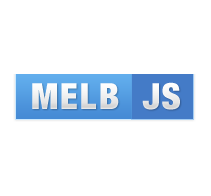JavaScript and Front End Engineering
Curated by founder John Allsopp, who has over 20 years of experience with Web development technologies, Code is recognised around the World as an agenda setting event, covering the latest developments in the Web's programming language, JavaScript, the Web platform, and current practice in security, performance and Web engineering.
Real World Knowledge
Like all our events, Code features a mix of renowned international speakers, and local experts, all sharing deep experience of real world projects.
Featuring a mix of renowned international and local speakers, including the Code is one of the World's leading events for Front End Engineers and JavaScript developers.

- 400+ Passionate attendees
- 20 Transformational speakers
- 2 Cities
Big Ideas
Begin and end each day with world-leading experts.
View the whole schedule at a glance

Once More with Feeling
Tim Kadlec Front End Performance
As an industry, we’re starting to recognize that what really matters for performance is how fast the experience feels. While this seems like a relatively minor revelation, in reality it requires a significant shift in thinking.
Let’s look at how to reframe performance on the web, and what techniques and technologies are out there to help us create experiences that feel fast and frictionless.
Read More

CSS Grid Layout
Rachel Andrew Founder, Perch
Since the early days of the web, designers have been trying to lay out web pages using grid systems. Likewise, almost every CSS framework attempts to implement some kind of grid system, using floats and often leaning on preprocessors.
The CSS Grid Layout module brings us a native CSS Grid system for the first time—a grid system that does not rely on document source order, and can create complex layouts which are easily redefined with media queries. Following along with practical examples, you’ll learn how Grid works, and how it can be used to implement modern layouts and responsive designs.
Read More
Plus in-depth sessions like these
All our events feature industry leaders, and topics like these

Flexing your layout muscles - a pragmatic look at Flexbox
Stephanie Rewis Design Systems Lead
A funny thing happened on the way to building a modern CSS Framework — one where IE8 and IE9 were no longer pulling on our coattails. Suddenly positioning, float left and right, and display table and inline-block weren't our only layout options. We realized we had entered a world where we could solve some of our usual challenges in a more modern way. Enter flexbox, with it’s combination of simplicity, complexity, joy, and frustration.
Drawing from real-world examples, we’ll examine some of the more common layout challenges that flexbox simplifies, as well as some real-world gotchas we’ve experienced.
Read More

Does Your Web App Speak Schadenfreude?
Greg Rewis Web Industry Legend
¿Hablas español? Sprechen Sie Deutsch? No? Well even if you don't speak another language, chances are good that your web application will need to. During this session, we'll use some real world examples to explore the many challenges involved in localizing a web application–from properly sizing text and controls to the use of color and images to cultural issues you might not even be aware of. And of course, we'll look at some best practices to ensure your web app can tackle any language thrown at it.
Read More

Zen of JavaScript
Dmitry Baranovskiy Computer Scientist
A long time has passed since JavaScript became mainstream. And despite multiple attempts, there is still no right single way to write code in this language. Everybody is using it in their own special way and most people still fill that they are failing to tame the language.
In this talk I will try to show you what the language has been trying to tell us for all these years, where the real path to enlightenment is, or at least we can have fun and look at things we know (or pretend to ;) from an unorthodox point of view. ;)
Prepare to meet JavaScript… again.
Read More

The State of Front-End Testing
Alicia Sedlock Front End Developer
You may have heard developers say that testing your code is a best practice. But what kinds of testing are they talking about? From unit and acceptance testings, to code linting, visual regression testing and more, it may be difficult to sort out which kind of testing is right for your team or project.
In this talk, we will cover the breadth of testing strategies available to front-end developers now, their benefits, and considerations before integrating them into your applications.
Read More

Taking Back Control over Third Party Content
Yoav Weiss Web Performance Specialist
We have a complex love-hate relationship with the third party content on our sites, and it has taken a turn for the worse. On the one hand, third party content often pays the bills. On the other hand, recent developments have increased its “cost”. HTTP/2 means third party content is even more of a performance burden than before, the weight of that content is taking up a larger and larger percentage of our site’s overall bytesize, ad-blockers mean users have had enough, and projects like Google AMP and Facebook Instant Articles mean that embedders feel the same.
Our lack of control over what 3rd parties are doing on our sites is showing. How can we gain it back?
In this talk, we will discuss mitigation techniques to reduce the performance and security impact third parties have on our site as well as monitoring what these scripts are doing.
We will also talk about a long term plan to restore sanity to the ecosystem. We need mechanisms that will enable us to put the developers back in the driver’s seat and at the same time enable smarter ad blockers, so that responsible 3rd parties can remain a source of income. I’ll propose such mechanisms.
Read More

Rediscovering the Server
Josh Duck JavaScript, Facebook
React makes it easy to build beautiful and responsive JavaScript applications. But moving rendering from server to client reveals new and unique performance challenges. Preloading data, minimizing round trips, and reducing JS overhead are some of the problems JavaScript developers face.
Server and client execution are fundamentally different; each has distinct strengths and weaknesses. Building fast applications means designing systems that combine the strengths of both of these environments. We'll look at how Facebook is doing this with abstractions like GraphQL and Relay, the specific problems that each library solves, and how we can apply the same design principles to other performance problems.
Read More

Web Architectures roundtable
Various A selection of speakers
The Web used to be easy. Some HTML, a few images, some CSS. Then title JS. And then along came libraries an frameworks like jQuery. Then we started building more and more complex things, and tooling arrived to help us manage the complexity of our processes and workflows and code base.
Now in a world of React and Angular, our HTML and CSS increasingly live inside our JavaScript applications. This solves some problems, and introduces others. So where does the balance lie? What do modern Web architectures look like? What should we be singing in the 80s? What should we be singing now?
In this roundtable discussion, our speakers and leading lights in the Industry discuss the current and future shape of Web architectures.
Read More

The Power ⚡️ and Responsibility 😓 of Unicode Adoption ✨
Katie McLaughlin Operations Engineer
Communication is difficult. Whether it’s between humans or machines or a combination of the two, trying to translate meaningful information is a lossy process.
Converting programming languages to use the new Unicode standard is hard, but once it's in place, you get this marvellous feature-add: Emoji compatibility. No longer do we have to make faces with symbols, or be forced to platform-specific emoticons! Rejoice in the extended character set!
Emoji has a rich history as a way to allow the communication of ideas in a reduced amount of data, and dates back to a time where this was important: SMS communications in Japan. However, as social networks feverishly try and clamber into this bandwagon, their implementations of the standard create more issues with miscommunication that aren't already possible with a 12x12 pictograph.
From the technical to the social aspects, mojibake and UTF-8, this talk will cover why the extended character set provided by the Unicode standard needs to be treated with responsibility by users and platforms alike.
This talk is not just an excuse to see what parts of the conference stack can’t handle Unicode, I promise. 😇
Read More

CSS: Code Smell Sanitation
Fiona Chan CSS Expert
Imagine this: you are reviewing someone's CSS. Everything looks valid and has passed linting. Does that mean it's ready for production? What are some other things you should be spotting before passing the code review?
In this talk, Fiona will show you how to spot some of the early symptoms of code smell and how you can make your CSS more robust.
Read More

The Things You Can't Do
Rob Howard Functional Programmer
Flexible. Dynamic. Feature-rich. These are usually terms to describe programming languages, libraries and frameworks; they sound great, but what are we trading off to get them? And what can we can gain if we run in the other direction and strive for less of these qualities?
In this talk we'll draw a line straight through ES6, immutability, functional-style", Flow, Elm and PureScript in twenty minutes: why they're useful, what you have to give up to make the best use of them, and why that isn't a bad thing. It's a tall order, but it's a tour that'll get you thinking, and will leave you with enough jumping-off points to dig into for months to come."
Read More

Installable Web apps with Web App Manifests
Elise Chant Lead Front-end, hipages
Last year at Code, Alex Russell launched Progressive Web Apps, an idea that has taken the Front End world by storm in the intervening 12 months.
A key aspect of a progressive Web App is the ability to install it on the user's home screen. So, just how do we achieve that? Enter Web Manifests (*not* the appcache manifest), an emerging standard for specifying the home screen experience of Web applications.
Learn how you can specify icons (at various resolutions and sizes) splash screens, preferred orientations, related applications and more. We'll also cover device and browser support, consider some security implications, and more to get you up and running.
Read More

The SemVer Talk 1.0
Ben Buchanan Front End Lead, Ansarada
Everyone deals with version numbers... and not just for code. Which version of jQuery are you using? Which PSD is the final design? Should you upgrade your mobile phone's OS?
When it comes to production systems, meaningless version numbers are not just annoying - they can be destructive. Package management systems like NPM expect published modules to follow Semantic Versioning. When these rules are broken, chances are your project will be broken too.
So what ARE the rules? Can they rescue your designs from new-website-final_final2_revised.psd hell? What should you do with your code and what should you expect from others? How can you minimise risk without spending your entire day reading release notes?
It's time to learn the ways of SemVer.
Read More

Memory Management in V8
Hadi Michael Software Engineer
Long garbage collection pauses in JavaScript, can lead to noticeable performance degradation and poor user-experiences. Understanding this garbage collection mechanism is essential to building advanced applications with effective memory management.
This talk will cover the fundamentals of automatic memory management in the V8 JavaScript engine. We will also discuss some upcoming optimisations that are aimed directly at tackling garbage collection jank. Finally, we will explore some common memory problems, as well as the tools and techniques available for diagnosing them.
Read More

Rats of the Maze
Simon Swain Javascript and Hardware
The year is 2048.
Thirty years ago we outsourced the mundane running of our lives to Machines. Machines that learn. The Machines learnt too well.
All computing resource on the planet has been consolidated in an immense Maze hewn out of solid rock.
No humans are permitted in The Maze, but the warm glow of it's reactors make it an ideal home for millions of giant Rats.
Your mission is to enter The Maze and deactivate the systems that power The Machines.
No human has ever returned from The Maze of the Rats.
+++ TRANSMISSION END
Rats of the Maze is an arcade simulation.
The talk will be a journey through the theory and technique of programming radioactive maze-solving rats that seek human flesh -- a journey from the very foundations of computer memory through to the algorithms used to create and solve mazes, wrapped up in unique hand crafted vector graphics running in the browser.
Read More

Progressing your Web Apps with Service Worker
Marcos Carceres Mozilla
By now, most Front End Devs will be aware of the idea of Progressive Web Apps (incidentally launched as a concept at last year's Code conference by keynote speaker Alex Russell).
The key enabling technology of "PWAs" is Service Worker, which brings offline capabilities, properly functional caching (sorry AppCache, it's you, not me) and enables engaging new features like Web notifications, and the ability to add a Web app tot he user's homescreen.
So all this magic must be really complex to implement? Think again.
Read More
Masterclasses
We've got two different, highly relevant, one day workshops, one in Sydney and one in Melbourne.

CSS Layout for layout
Melbourne, August 3rd
with Rachel Andrew
CSS Layout has been stuck somewhere around 2006 for the last ten years. We are still hacking around with techniques that were never designed for full page layout, let alone complex web application layout. However hope is in sight. A raft of exciting new layout methods are making their way into our browsers and our hands right now. However modules such as Flexbox and CSS Grid Layout are so different to everything that has come before, and need a very different approach.
In this workshop you’ll learn how to really use these new layout methods. From the modules that can be used right now in many browsers - Multi-column layout, Flexbox and Shapes to those that are just around the corner such as CSS Grid Layout. This workshop is completely hands on, we’ll be writing CSS together all day. By the end of the day you should have the confidence to use and experiment with these layout methods, and be able to make good decisions about what to use in your projects now and in the future.
This workshop will cover:
- An intro to the new CSS Layout: what are these modules and why are they so different to what has come before
- Multiple-column Layout: not just for newspaper columns, this module has good support in browsers and can be used in some helpful ways.
- Flexbox: it’s time to really see what Flexbox can do for us. This specification has been designed for one-dimensional layout. What does that really mean, and where should we put Flexbox to use?
- Shapes: flowing text around non-rectangular objects is possible! We take a look at Shapes, a module that can be used in a progressively enhanced way to add finesse to your designs.
- CSS Grid Layout: This is the game-changer, a true system of two-dimensional layout on the web. Define a grid and place content on it. It’s a huge specification and Rachel has been working with it as it has emerged over the last 3 years, she’ll share her knowledge and get you quickly up to speed.
- Box Alignment Level 3: this is the vertical centring module! Taking the alignment capabilities of flexbox to other positioning methods.
- Other interesting things: there are some tantalising new features lurking in CSS Specifications and browser implementations - Regions, Exclusions, we’ll take a look.
- Browser support: throughout the workshop we’ll discuss browser support and how to use these features in a progressively enhanced way.
$499 for conference attendees, $599 workshop-only early bird (ends June 24), $699 workshop only standard pricing
Melbourne
- 9am–5pm, Wednesday August 3rd
- Karstens, 123 Queen Street
- Melbourne

Putting ES6 to work on the Web and on the Server
Sydney, July 27th
with Marcos Caceres
ES6 (ES2015) has arrived, now fully standardised, and well supported across a range of browsers, with transpilation support via Babel, and other transpilers, and of course support in Node.js.
In this whole day workshop, Marcos Caceres will get you up to speed with ES's and new primitives, and show you how you can take full advantage of these new features on the Web.
In it you'll learn how to appropriately make use of:
- ES6 Fundamentals: including let, const, arrow functions, destructuring, rest, spread, default params, and template strings.
- Primitives: Iterables, Maps, Sets, Objects, WeakSets, WeakMaps
- Asynchronous JavaScript: promises, generators, and async/await.
- ES6 in the browser: bringing all the above together to make a site
- offline-capable using Service Workers.
Who's it for?
This workshop is for experienced JavaScript developers that are looking to broaden their knowledge of the language and its features. It will also prepare you to make full use of the next generation of Web APIs. By the end of the day, you will have a strong foundation on which to build progressive web applications, and confidently write async code on the server.
$499 for conference attendees, $599 workshop-only early bird (ends June 24), $699 workshop only standard pricing
Sydney
- 9am–5pm, Wednesday July 27th
- 2-12 Foveaux St
- Surry Hills
Melbourne
Code 2016 will be held in the ANZ Pavilion at the iconic Arts Centre Melbourne, right on the Yarra in Southbank.
ANZ Pavilion,
Arts Centre Melbourne,
100 St Kilda Road, Melbourne
Getting there:
With excellent public transport connections right outside, and Flinders Street Station right across the bridge, it's our best connected location yet.
Check out Wotif and Airbnb for nearby hotel and accomodation options.
Social:
Attending our events is a whole lot more than what happens from 9–5, and Melbourne has countless great places to grab a drink or a meal at any hour of the night or day. Here's some of our favourite close by places.
Sydney
Code 2016 Sydney will be held at the National Maritime Museum, in Darling Harbour.
- Maritime Museum,
- 2 Murray St,
- Sydney, NSW
Getting there:
The Museum is a very pleasant 10 minute walk from Town Hall Station, or right across the road from the Pyrmont Bay Light Rail stop. Darling Harbour is also serviced by many ferries and buses.
Accommodation:
Darling Harbour and surrounds has many accomodation options, from budget to 5 star.
Check out Wotif and Airbnb as well
Social:
Attending our events is a whole lot more than what happens from 9–5, and Sydney and Melbourne have countless great places to grab a drink or a meal at any hour of the night or day.
Find the right ticket for you |
Gold Pass
|
Silver Pass
|
Classic Pass
|
Conference
|
|
|
|
Speaker DinnerJoin our speakers at a nearby restaurant for a relaxing meal, and engaging company. |
|
|
|
Workshop
|
|
||
Videos |
|||
|
|
||
|
|
|
|
|
|
|
|
|
|
|
|
Find the conference pass for you
Gold Pass
Conference
Speaker Dinner
Workshop
- $1,699
Register Sydney Register Melbourne
Silver Pass
Conference
Speaker Dinner
add a workshop for just $499
- $1,399
Register Sydney Register Melbourne
Classic Pass
Conference
add a workshop for just $499
- $1,199
Learn together
Teams get more
Send a team of 3 or more to Code 16 and save $100 per team member off the prevailing full price for a classic or silver ticket, or $200 off a Gold (conference workshop and speaker dinner).
Just register 3 or more people and you'll automatically get the discount for the conference, workshop or conference/workshop combination.
Special Pricing
To make Code as accessible as possible we're offering even better pricing for a number of different types of attendee who may not have the biggest training budgets, but hurry, these are strictly limited (and please be cool, this is not just to help your boss get more bang for their corporate training dollars!).
Not for profit employees register for just $799, saving up to $500, using the code NFP when you register.
Independent professionals also register for just $799, saving up to $500, using the code freelance when you register
Partners
At Web Directions we work closely with partners to help make our events even better. Sponsor our coffee, a juice bar, a reception or drinks, and start, or grow your relationship with Australia's leading Front End engineers and JavaScript developers
Contact us for more on how we work can work with you to help you be even more awesome.
Partners

Community Partners


The price of anything is the amount of life you exchange for it
Henry David Thoreau
We know you are busy
Creating and managing a great team, exploring the creative limits of today's technology, and tomorrow's. We know your life is full to the brim with meetings you can't miss.
What we'll deliver is ROT (return on your time). We'll help you save time avoiding rabbit holes of hype that doesn't match reality. We'll help you invest your time wisely in the technologies, ideas and projects that will deliver for your company, clients and partners.
Praise for past Web Directions events
Web Directions is the must-attend event of the year for anyone serious about web development.
Phil Whitehouse, General Manager, DT Sydney
I’ve been admiring the Web Directions events for years, and was honored to be part… What a fantastic event!
Ethan Marcotte, inventor of "responsive Web design"
Out of any conference, Web Directions is far and away our favourite
Dave Greiner, founder, Campaign Monitor
About Us
Co-founded and now run by John Allsopp, Web Directions has for over a decade brought together leading developers, engineers, visual, IxD, UX and product designers, Art and Creative Directors, indeed everyone involved in producing web and digital products to learn from one another, and the World's leading experts across this vast field.
We spend our lives thinking about what comes next, keeping up with trends in technology, practices and processes, and filtering the hype, to make sure you don't miss trends that matter, and don't waste time on hype that doesn't.
We promise attending one of our events will leave you significantly better versed in the challenges you face day to day, and in solutions for addressing them.
John Allsopp
John Allsopp has been working on the Web for over 20 years. He's been responsible for innovative developer tools such as Style Master, X-Ray and many more. He's spoken at numerous conferences around the World and delivered dozens of workshops in that time as well.
His writing includes two books, including Developing With Web Standards and countless articles and tutorials in print and online publications.
His "A Dao of Web Design" published in 2000 is cited by Ethan Marcotte as a key influence in the development of Responsive Web Design, who's rightly acclaimed article in 2010 begins by quoting John in detail, and by Jeremy Keith as "a manifesto for anyone working on the Web".
Code of Conduct
For over a decade, we've worked hard to create inclusive, fun, inspring and safe events for the Web Industry.
As part of our commitment to these values, we've adopted a code of conduct for all involved: ourselves, our speakers, our partners and our audience.
If you have any concern or feedback, please don't hesitate to contact us.